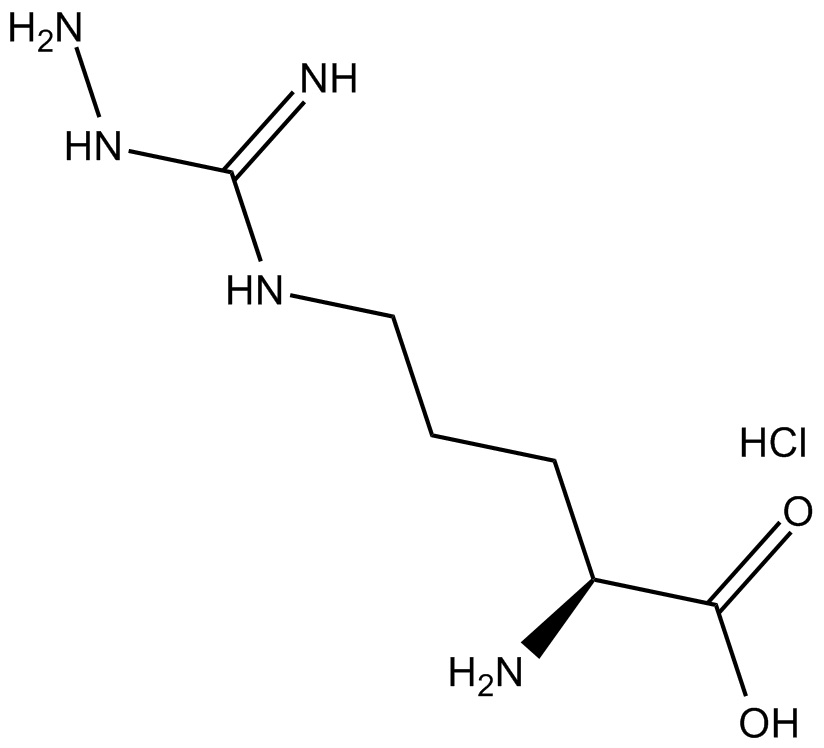NG-amino-L-Arginine (hydrochloride) |
| Catalog No.GC15316 |
nNOS, iNOS, and eNOS inhibitor
Products are for research use only. Not for human use. We do not sell to patients.

Cas No.: 1031799-40-2
Sample solution is provided at 25 µL, 10mM.
NG-amino-L-arginine, a novel structural analog of L-arginine, is an inhibitor of nitric oxide synthase (NOS) [1,2]. Nitric oxide synthases (NOSs) have been involved in catalyzing the production of nitric oxide (NO) from L-arginine. As an important cellular signaling molecule, NO has been implicated in modulating vascular tone, airway tone, insulinsecretion, and peristalsis. It has also been shown that NO is involved in angiogenesis and neural development and can function as a retrograde neurotransmitter [3].
In vitro: NG-amino-L-arginine potently and stereoselectively induced endothelium-dependent contraction. NG-amino-L-arginine caused concentration-dependent, competitive, and stereoselective antagonism of acetylcholine-elicited relaxation and cyclic GMP accumulation. NG-Amino-L-arginine was 100- to 300- fold more potent than NG-methyl-L-arginine [1]. NG-amino-L-arginine (100 μM) almost abolished endothelium-dependent relaxation induced by acetylcholine, but was rapidly restored by addition of 300 μM L-arginine. The maximal response to acetylcholine was inhibited by NG-amino-L-arginine in excess of 1 μM and was abolished by concentrations in the range of l0-30 μM [1]. NG-Amino-L-arginine inactivated the citrulline-forming activity of the nNOS, iNOS, and eNOS isoforms with the maximal inactivation rates of 0.35, 0.26, and 0.53 min-1 and Ki values of 0.3, 3, and 2.5 μM, respectively [2].
In vivo: In awake animal models of sepsis, treatment with NG-amino-L-arginine showed higher systemic and pulmonary vascular resistance indices and decreased heart rates, cardiac indices, oxygen delivery indices, and oxygen consumption indices when compared with controls [4]. NG-amino-L-arginine increased mortality rates after endotoxin challenge [4].
References:
[1] Fukuto J M, Wood K S, Byrns R E, et al. NG-amino-L-arginine: a new potent antagonist of L-arginine-mediated endothelium-dependent relaxation[J]. Biochemical and biophysical research communications, 1990, 168(2): 458-465.
[2] Wolff D J, Lubeskie A. Inactivation of Nitric Oxide Synthase Isoforms by Diaminoguanidine andN G-Amino-L-arginine[J]. Archives of biochemistry and biophysics, 1996, 325(2): 227-234.
[3] Frstermann U, Closs E I, Pollock J S, et al. Nitric oxide synthase isozymes. Characterization, purification, molecular cloning, and functions[J]. Hypertension, 1994, 23(6 Pt 2): 1121-1131.
[4] Cobb J P, Natanson C, Hoffman W D, et al. N omega-amino-L-arginine, an inhibitor of nitric oxide synthase, raises vascular resistance but increases mortality rates in awake canines challenged with endotoxin[J]. Journal of Experimental Medicine, 1992, 176(4): 1175-1182.
Average Rating: 5 (Based on Reviews and 32 reference(s) in Google Scholar.)
GLPBIO products are for RESEARCH USE ONLY. Please make sure your review or question is research based.
Required fields are marked with *




















